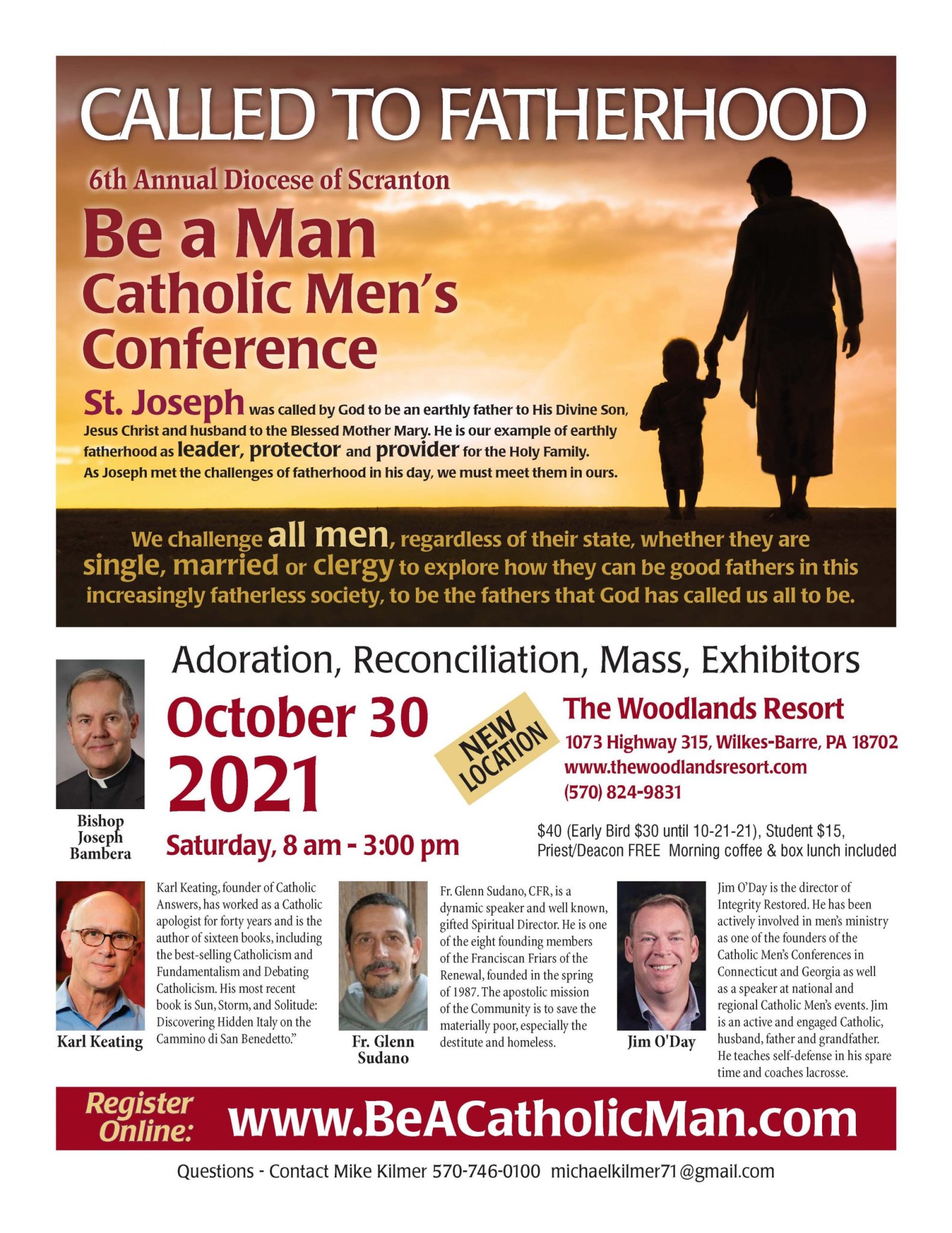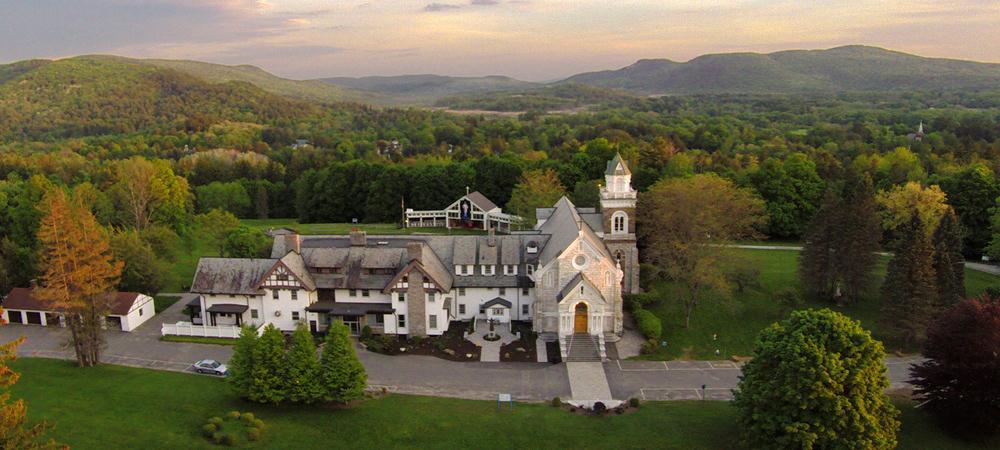
Pilgrimage to the National Shrine of Divine Mercy
Stockbridge, Massachusetts
Saturday, November 6, 2021
- Presentation by Father Chris Alar
- Tour the grounds
- Mass
- Eucharistic Adoration
- Fabulous gift shop
Bus leaves Montage Mall Parking Lot (located near DSW store) at 7:00am.
Returns at 7:00pm
Breakfast, Lunch and Dinner included.
$80 per person
September 20, 2021
WASHINGTON— National Migration Week 2021 starts today and will conclude on September 26 in solidarity with the Holy See’s observation of the World Day for Migrants and Refugees (WDMR) on September 26.
The theme for this year’s WDMR is “Towards an Ever Wider ‘We’,” which Pope Francis drew from his encyclical Fratelli tutti. He emphasized in his annual WDMR message that such a focus calls on us to ensure that “we will think no longer in terms of ‘them’ and ‘those,’ but only ‘us’” (Fratelli tutti, no. 35) and this universal “us” must become a reality first of all within the Church, which is called to cultivate communion in diversity. In general, National Migration Week is meant to emphasize the ways in which the migration question is important for the Catholic Church in the United States.
“The migration story is one of compassion, welcome, and unity,” said Bishop Mario E. Dorsonville, auxiliary bishop of Washington and chairman of the U.S. Conference of Catholic Bishops’ (USCCB) Committee on Migration. “It is about opening our hearts to others, and at this critical juncture, we do not have to look far to see its practical application or find those with a need to migrate. The Holy Father calls us to embrace and express the Church’s catholicity—her universality—‘according to the will and grace of the Lord who promised to be with us always, until the end of the age.’ Let us, the Catholics of the United States, join together to answer his call and be especially mindful of it during this upcoming week.”
In previous years, National Migration Week was observed in January, but it was changed recently by the USCCB to align with the Vatican’s observation of the World Day of Migrants and Refugees. Educational materials and other resources for National Migration Week are available for download on the Justice for Immigrants website.
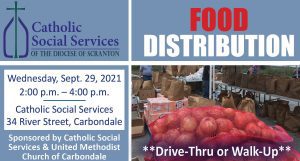 CARBONDALE – Catholic Social Services of the Diocese of Scranton is continuing its outreach to the community during the COVID-19 pandemic.
CARBONDALE – Catholic Social Services of the Diocese of Scranton is continuing its outreach to the community during the COVID-19 pandemic.
A free food distribution event will be held on Wednesday, September 29 from 2:00 – 4:00 p.m. at the Catholic Social Services Carbondale Office, 34 River Street, Carbondale.
No pre-registration is necessary.
Anyone in need is welcome to either drive-up or walk-up for assistance.
Catholic Social Services and the United Methodist Church in Carbondale are sponsoring this event.
This special food distribution is in addition to the normal hours for the Catholic Social Services Carbondale food pantry, which are Monday, 9:00 a.m.-Noon; Tuesday and Wednesday, 9:00 a.m.-Noon and 1:00-4:00 p.m.; Thursday, 1:00-4:00 p.m.; and Friday, 9:00 a.m.-Noon.
During the most recent special food distribution in Carbondale, held on Aug. 26, a total of 122 children, 246 adults and 162 seniors received assistance.
 SCRANTON – When Thomas and Stephanie Dzwonczyk talk about the importance of the Diocesan Annual Appeal, they speak from a personal perspective. Their son, Thomas, is a seminarian for the Diocese of Scranton who recently started his second year at Saint Mary’s Seminary in Baltimore, Md.
SCRANTON – When Thomas and Stephanie Dzwonczyk talk about the importance of the Diocesan Annual Appeal, they speak from a personal perspective. Their son, Thomas, is a seminarian for the Diocese of Scranton who recently started his second year at Saint Mary’s Seminary in Baltimore, Md.
Through their son, Tom and Stephanie have met all nine of the current seminarians for the diocese. This year, the Dzwonczyks are one of six local couples serving as regional chairs for the Appeal.
“These pious, dynamic, engaging and talented young men give us great confidence in the future for the Diocese of Scranton and the Catholic Church as a whole,” Thomas said. “They will one day lead us in worship, administer the Sacraments and preside over the weddings and funerals of those we love.”
Gifts to the Diocesan Annual Appeal have a wide-ranging, significant impact throughout not only the diocese but also the entire community of northeastern and north central Pennsylvania. Providing assistance to seminarians who are in priestly formation is just one of the many things that the Appeal supports.
“No one with a true calling to the priesthood should be turned away for lack of funds,” Thomas added.
The 2021 Diocesan Annual Appeal: Rising Together in Christ will begin in all parishes in the Diocese of Scranton on Sept. 18 and 19. This year’s goal is $4.5 million.
An Appeal video will be shown at Masses and made available on parish websites and Facebook pages. Six regional Appeal videos have been produced to feature ministries funded by the Appeal in each area of the diocese. The videos are all now available on the Diocese of Scranton website.
“The last 18 months have been challenging for all of us. One of the many things the COVID-19 pandemic has taught us is just how interconnected we are and how much we need one another,” the Most Rev. Joseph C. Bambera, Bishop of Scranton, said. “Through the generosity of Diocesan Annual Appeal donors, we have been able to touch thousands of lives – serving the poor, educating our children and spreading the Gospel message.”
Because of the pandemic, the traditional In-Pew Commitment Weekend for the Appeal will take place differently. Pledge envelopes will be mailed to parishioners’ homes and donors will be asked to bring the envelopes to their churches on the weekend of Oct. 16 and 17.
This year, for the first time, the Diocese of Scranton will also be participating in the national #iGiveCatholic campaign, a special Thanksgiving-season campaign that concludes on Giving Tuesday and allows donors an easy and convenient way to donate.
Gifts to the Appeal have a significant impact to help diocesan ministries serve an increasing number of people in need and provide opportunities to offer programs and services in different ways in response to the pandemic.
There are hundreds of stories of how Appeal funds make a difference throughout the community.
In Pike County for example, Saint Patrick Church in Milford and Saint Joseph Church in Matamoras receive Social Justice Grants to support important projects. One of several causes the two churches support is Pike County Hands of Hope, a Christ-centered organization dedicated to providing compassion and hope to homeless families by meeting their basic needs of food, clothing and shelter.
With no homeless shelters in Pike County, volunteers respond to dozens of calls for help to their “Hopeline.” Since 2016, the Hopeline has received an average of 249 calls per year. During the pandemic, that number increased significantly. Behind each call is someone needing assistance.
“We really appreciate the Diocesan Annual Appeal for helping us so much,” Anne French, Pike County Hands of Hope volunteer, said.
In addition to Social Justice Grants that funnel back directly to parishes – donations to the Annual Appeal support many different Diocesan ministries.
Catholic Social Services of the Diocese of Scranton serves hundreds of thousands of individuals, families and seniors through its kitchens, food panties and shelters each year. During the pandemic, the agency met the needs of clients by holding several extra food distributions outside normal food pantry hours.
Appeal gifts also support Diocesan Catholic School teachers and staff as they make the significant changes that are needed to continue to provide a quality, in-person education to our students in the safest possible way.
Donations to the Appeal support the Diocesan Office for Parish Life in its efforts to develop new ways to connect to parishes and reach out to parishioners. In an effort to reach out to our Hispanic brothers and sisters, the Hispanic ministry office recently launched a weekly Spanish Catholic radio show on LaMega Radio, which broadcasts in Scranton and Wilkes-Barre.
Thousands of the faithful who are not able to attend Mass in person continue to watch the broadcast and livestream Masses from the Cathedral of Saint Peter. Since the beginning of the pandemic, and the launch of Mass broadcasts on the weekends, viewership of Catholic Television has increased by ten times online alone. The Catholic Light and information provided on the Diocesan website are also funded by donations to the Appeal.
In addition to assisting our seminarians, gifts to the Appeal also provide care and support for retired and ill Diocesan priest who have dedicated their lives in faithful service to parishioners throughout the diocese.
Donors to the Appeal may designate their gift to any of the ministries listed above.
For more information on the Diocesan ministries supported by gifts to the Annual Appeal, to view one of the regional videos or to make a donation online, visit annualappeal.org. Gifts may also be made by calling the Diocesan Development Office at (570) 207-2250 or by sending a donation to: Diocesan Annual Appeal, 300 Wyoming Avenue, Scranton, PA, 18503.
To make an online gift now visit: www.annualappeal.org
SCRANTON – Better late than never.
The annual Saint Patrick’s Parade Day Mass will be celebrated at 10 a.m. on Saturday, Sept. 18, at the Cathedral of Saint Peter in Scranton. All are welcome to attend.
The liturgy is traditionally celebrated in March in conjunction with the city of Scranton’s annual Saint Patrick’s Day Parade – but because of the COVID-19 pandemic – the event was pushed back six months.
Following the Mass, the Saint Patrick’s Parade is expected to take to the streets of the Electric City beginning at 11:45 a.m.
The Most Rev. Joseph C. Bambera, Bishop of Scranton, will be the principal celebrant and homilist for the Mass. Concelebrants will be priests from the Diocese of Scranton.
The Mass will be broadcast live on CTV: Catholic Television of the Diocese of Scranton and will be rebroadcast on Tuesday, Sept. 21, at 8 p.m., and Wednesday, Sept. 22, at 10:30 a.m. It will also be available for viewing on the Diocese of Scranton’s YouTube Channel.
This year marks the 59th Anniversary of the Saint Patrick’s Parade in Scranton.
Saturday’s Mass is being offered in memory of all those members and friends who passed away since the last Mass was celebrated, including John Klikus, Frank Brazill, Pat Sweeney, Brian Craig, Attorney Robert Munley and Patrick Dougher.
Albert O’Donnell, President, Saint Patrick’s Parade Association of Lackawanna County, will serve as lector for the Mass and Frank Jones will serve as cantor.
The Offertory gifts will be presented by Dorothea Crowley, President, Ladies Ancient Order of Hibernians of Lackawanna County; W. David Fitzpatrick, M.D., President, Friendly Sons of Saint Patrick of Lackawanna County; Jeff Sears, President, Ancient Order of Hibernians of Lackawanna County; and Lori Wagner, President, Society of Irish Women.
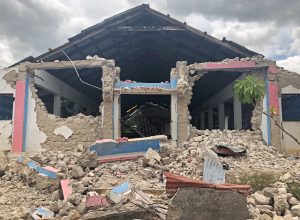
SCRANTON – The Diocese of Scranton will take up a special collection in all parishes to help the victims of several recent disasters on the weekend of Sept. 25 & 26.
In a letter to pastors, the Most Rev. Joseph C. Bambera, Bishop of Scranton, explained the funds would be used to assist those impacted by a recent earthquake and tropical storm that hit Haiti as well as the countless people who have been impacted by Hurricane Ida here in the United States.
Hurricane Ida made landfall in the Gulf Coast and moved inland as a tropical storm, causing damage and suffering in many states.
All funds received will become a part of the Bishops Emergency Disaster Fund and will be used to support the United States Conference of Catholic Bishops for pastoral and reconstruction needs of the Church as well as efforts of Catholic Charities USA and Catholic Relief Services, the official relief agencies of the U.S. Catholic Church.
While recognizing the continuing COVID-19 pandemic has imposed financial challenges on many parishioners, the bishop stressed that there is a growing need in communities impacted by both disasters and expressed hope that people will respond in such a time of need.
HURRICANE IDA’S IMPACT WIDESPREAD
Hurricane Ida made landfall in Louisiana Aug. 29 as one of the most powerful storms to strike the state. It caused extensive damage in the Gulf Coast region, knocking out power, destroying homes, buildings and churches, and causing extensive flooding.
The storm continued toward the Northeast, where it dropped heavy rains in New Jersey, New York, Pennsylvania and Connecticut, leading to massive flooding of homes, subways and streets. Through Sept. 7, Ida had claimed 89 lives in the U.S. Another 20 people died in Venezuela before Ida headed northward.
Catholic Charities in and around the areas of Louisiana and Mississippi affected by Hurricane Ida – one of the most powerful storms to hit the continental U.S. since Hurricane Katrina in 2005 – are working hard to assist residents. More than two million people initially lost electricity after the storm.
Louisiana Governor John Bel Edwards has classified the damage as “catastrophic.”
Pastors in the areas that suffered the most damage during Ida are now getting help from people all around the community.
Father Jared Rodrigue, pastor, Saint Luke the Evangelist Church in Slidell, talked about the outpouring of support.
“It is unfortunate that it takes a tragedy to see Catholic Church teaching in its essence – to see faith in action” Father Rodrigue said. “There’s great hope in knowing we are capable of giving time and resources.”
Officials in the hardest hit areas say there are still many houses with water and some houses that are not even accessible.
POST-QUAKE HAITI: FUNERALS AND A DAILY QUEST FOR FOOD, WATER, SHELTER
Weeks after Haiti’s Aug. 14 earthquake, the country’s southwest peninsula is still marked by funerals, aftershocks and a daily search for clean water, food and shelter.
“One of the things that really struck me two weeks out is the number of funerals – everywhere you go there are funerals, as people are burying their loved ones, and it brings a sense of overwhelming grief when that many people pass away; it is very striking,” said Beth Carroll, head of programs for Catholic Relief Services in Haiti.
The magnitude 7.2 quake killed more than 2,200 and injured more than 12,200 others. About 130,000 homes were damaged, including 50,000 which were completely destroyed, according to Haiti government estimates.
“It is very visible in the affected communities, where 90% of homes, schools and churches were flattened in the hot spots,” said Carroll. “There is also significant damage which is less visible: a lot of water systems are damaged and no longer functioning, or the water is dirty and not usable.”
Staffers of CRS, the U.S. bishops’ international relief and development agency, are operating under tarps at a parking lot near their operations center in Les Cayes following damage to their offices.
Following the tragedy, CRS has been focused on distributing emergency shelter and hygiene kits in concert with the Haiti government’s thrust to help Haitians rebuild their lives at home and discourage them from relocating to tent cities or sleeping in the streets.
CRS maintains a stockpile of emergency supplies in-country and has embellished its earthquake response resources with goods from the U.S. military along with the U.S. Agency for International Development, the United Nations and World Vision, which works in Haiti but had no presence in the Les Cayes region.
Les Cayes is Haiti’s third-largest city. Carroll said local hospitals and health clinics have done the best they can to treat the injured with their available resources and are moving toward normalcy following the crisis. They also moved many patients to other hospitals in the southern region or to Port-au-Prince.
A major concern in the Les Cayes region is damage to schools and the potential fallout for children, who already have lost significant time in the classroom due to the COVID-19 pandemic and Haiti’s dysfunctional political situation and widespread food insecurity.
“We would really like to see how we can prevent a late start to the school year, and many schools aren’t going to be able to accept children,” Carroll said. “They really can’t afford to miss further class time.”
CRS is also working closely with the local Catholic diocese in Les Cayes as well as the regional office for Caritas Internationalis, which Carroll said recently lost its regional director to COVID-19.
Caritas has “started a very rapid response program, and we are supporting them and doing training with them despite the upheaval of a new (Caritas regional) director, an earthquake and a recent tropical storm (Grace) — and yet they are still out there doing their project,” Carroll said.
She said there is only speculation as to why Haiti has been spared so far from more cases of COVID-19.
“There are a lot of theories, including that the Haitian population is so young, and that people spent a lot of time outdoors in fresh air rather than indoors with recirculated air,” she said.
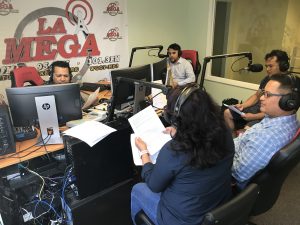
SCRANTON – With an excited “Buenos Dias,” the Diocese of Scranton’s Hispanic Ministry Program launched its first Spanish Catholic radio program on Aug. 14, 2021.
Through a partnership with La Mega radio, a local Spanish radio station serving the Latino communities in the Wyoming Valley, the Diocese now hosts a one-hour radio program to discuss the fundamentals of the Catholic faith each Saturday morning from 11:00 a.m. until noon.
The program is available locally at 94.9 FM in Scranton and 95.3 FM in Wilkes-Barre. The station also streams its programming at lamega95fm.com.
Jose Flores, Coordinator for Hispanic Ministry in the Diocese of Scranton, developed the idea for the show and secured the weekly timeslot.
“I felt that this was a great opportunity to reach out to our Spanish community and to respond to their needs,” Flores said. “Our primary goal is to share the Gospel and evangelize and share our faith and bring people back to the church if they are not there.”
Flores established a team of five people who help to get the weekly radio show on the air. Even though they are all new to radio broadcasting – they all participate in the live broadcasts. The team also receives assistance and guidance from Father Jonathan Kuhar, Parochial Vicar of both Saint John Neumann Parish and Saint Paul of the Cross Parish in Scranton.
Rufino Cano, a member of the radio broadcast team, says using radio is an effective means of communicating with the local Hispanic population.
“People listen to the radio, either for entertainment, at their jobs or at their homes. Having a Saturday morning program will be helpful to all of them,” he said.
Flores adds that having the radio program is a way to welcome newcomers into Catholic churches throughout the Diocese of Scranton.
“We’re seeing a wave of people moving in from New York and New Jersey so this is an opportunity for us to create community with them,” Flores explained. “I have met a few people who didn’t even know there was a Spanish Mass in town so I think this radio program is definitely an important tool for creating community and welcoming those who are new to the area into the Church.”
During the first few weeks, Spanish Catholic radio program members have introduced their ministry to the listening audience, discussed the love that God has for each one of us and talked about matrimony as both a Sacrament and Vocation. During the month of September, the program is focusing on the importance of the bible.
“A lot of people don’t know how to read the bible or know how many books are in the bible,” Cano said.
Even in its first few weeks, the radio program is getting the attention of Hispanic parishioners.
“When we first aired our program, after Mass, a couple people approached us saying congratulations, saying that it is nice for the Diocese to have something for the Spanish community that people can listen to. We had many congratulations from people. They were happy for us and the ministry that we are starting,” Cano added.
Seven years ago, Cano attended Mass at Saint John Neumann Parish in Scranton but was not involved in the life of the church. That has changed. He has joined the parish choir and taken classes to learn more about his faith – a faith he now willingly shares with others on the radio.
“I feel grateful and good to serve others through new ministries,” he said.
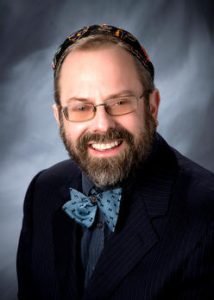 SCRANTON – When Rabbi Daniel Swartz received a letter from the Vatican last December inviting him to help put together a new declaration on climate change, the leader of Temple Hesed had only one thought.
SCRANTON – When Rabbi Daniel Swartz received a letter from the Vatican last December inviting him to help put together a new declaration on climate change, the leader of Temple Hesed had only one thought.
“My first reaction was which of my friends is pranking me,” Swartz admitted.
The letter was no joke. Swartz is one of 40 religious leaders and 10 scientists from around the world invited to participate in the ‘Faith and Science: Towards COP26’ conference on Oct. 4.
While Rabbi Swartz is preparing to head to Rome to participate in the conference, he has already taken part in a series of online meetings with the other members of the group – discussing how religion and environmental policy can intersect.
“We discussed what our different faith traditions from around the globe have to say about our responsibility to each other, to our common home, to action on climate change,” he said.
Rabbi Swartz called his friend and colleague in ministry, the Most Rev. Joseph C. Bambera, Bishop of Scranton, for his advice before agreeing to participate. The bishop assured him that under the direction of Pope Francis, conferences such as this are “true consultations.”
“The bishop was exactly right,” Swartz said. “I spoke up early and often and really shared teachings from the Jewish tradition and my own experience about the need for us to promote both justice and hope.”
Swartz holds degrees from Brown University in Geological Sciences and in Environmental Policy. He is also the author of “To Till and To Tend: A Guide for Jewish Environmental Study and Action” and “Faith Communities and Environmental Health: From Global to Local.”
The rabbi is one of only four Americans selected to participate in the drafting of the climate change declaration. Other religious leaders across the globe that participated in the discussions included the Archbishop of Canterbury, the General Secretary of the World Evangelical Association, the General Secretary of the Society of Friends of the World Lutheran Church and many others.
“It was a huge honor for me to participate with these other folks who are very notable religious leaders,” Rabbi Swartz said. “I really cannot emphasize enough that if I had not spoken with Bishop Bambera and he hadn’t encouraged me to speak up and to believe that if they asked me to be a part of this, then I deserved to be, I would have been really intimidated!”
Bishop Bambera says he is delighted that Rabbi Swartz is being acknowledged by the Vatican for his care and concern for social justice issues, particularly the environment.
“In my many years of friendship with Rabbi Swartz, I have come to know just how passionate and dedicated he is to addressing the crisis of environmental justice and demonstrating the connection between Judaism and the environment. As religious leaders and scientists gather at next month’s conference, Rabbi Swartz possesses the deep insight and wisdom to help address the many challenges that our planet faces in the coming decades and centuries,” Bishop Bambera said.
The bishop also noted that Rabbi Swartz’s work parallels the work of Pope Francis, who in 2015 published his encyclical, Laudato Si, which focuses on the urgent need to protect the environment, reduce wasteful lifestyles, stem global warming and protect the poor from the effects of climate change.
“He is such a hero of mine,” Rabbi Swartz said regarding Pope Francis. “As the pope has said, this is really one of the most profound religious questions of the day – what do we do in terms of how we treat our common home because it touches on so many aspects of what we consider to be fundamental religious questions. Most fundamentally, how can you be more pro-life than taking actions that may save literally billions of souls over the course of the future of humanity.”
When Rabbi Swartz and the other religious and science leaders come together on Oct. 4, they are expected to sign a climate change declaration that they have been working on. Swartz says the document has already undergone four drafts – and will be released ahead of the United Nations Climate Change Conference in November in Glasgow, Scotland.
The document is expected to press politicians to make courageous and ambitious decisions at the U.N. Conference.
“With all signs saying we’re running out of time” to address the issue of climate change, Rabbi Swartz says the document will indicate what “the faith community can do to help political leaders from around the world take this more seriously and act more urgently.”
Once signed, Rabbi Swartz will advocate for spreading the declaration around the world and getting all faith leaders to support it.
“I’m going to make the case that we should have some way for faith leaders and all people of faith to ‘sign on’ whether they are actually additional signatories to the original document or can sign a statement saying they agree with the principals,” Swartz said. “Let us get millions of people to sign this and speak from their faith.”
At a time when many politicians are focused on the next election cycle, Rabbi Swartz believes they should be focused on the decades and centuries to come.
“It’s not just about us but it’s about our children and our children’s children,” he said.
For the hope of his own daughter, Alana, who is 22, Rabbi Swartz hopes his efforts will make a difference.
“I hope our grandchildren live in a world where they have the blessings of a stable climate. There is a significant possibility that they won’t,” he explained.
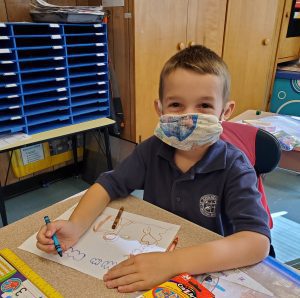 HAZLETON – As the new school begins, there are many new faces filling the halls of Catholic schools across the Diocese of Scranton.
HAZLETON – As the new school begins, there are many new faces filling the halls of Catholic schools across the Diocese of Scranton.
Overall, enrollment in Diocesan schools is currently up nearly nine percent over last year. Approximately 4,400 students have enrolled in the diocese’s 19 schools to date.
“We have once again prepared diligently this summer to open our schools in the safest way for the new year,” Kristen Donohue, Superintendent of Catholic Schools said. “We are excited to open our doors as we did last year to provide an excellent Catholic education in-person, while continuing to share good health. It is humbling to know the result of the efforts of everyone involved in our school communities is that more students will come to experience the transformative nature of a Catholic school.”
At Holy Family Academy in Hazleton, enrollment is up 17-percent this year.
Principal Jason Tribbet believes that is because many people in the community have seen how the Diocese of Scranton Catholic Schools safely managed in-person learning during the COVID-19 pandemic last year. He also credits school families for sharing the benefits of Catholic education.
“Word of mouth is huge. Our existing families are so supportive of our school and getting the word out to members of their church community, their little league teams and different things that take place in the area and spreading the word about Holy Family in a positive way,” he said.
At Notre Dame Elementary School in East Stroudsburg, enrollment is up 18-percent this year.
Interim principal Sister Dorothy Kibler, I.H.M. says several grades have waiting lists.
“We are getting students who are not of our Catholic faith and we always welcome them,” she said. “We have gotten some new students from as far away as Blakeslee.”
This year, Notre Dame is also pleased to welcome two international students from China. The family recently relocated to the United States because of employment.
“They have blended in very well. We have been so happy to welcome them,” Sister Dorothy added.
This is now the third year that schools have had to face challenges because of the pandemic in some form. Both principals say as the new school year begins, they will not become complacent about health and safety initiatives.
“I sent out a reminder to our staff this week to continue to follow our safety protocols,” Tribbet said. “The COVID numbers continue to keep increasing in our communities so we have to do our part.”
“Our faculty has been very vigilant about the protocols and making sure that the students are socially distant and wearing their masks. We reinforce the fact that it is to keep ourselves healthy and to keep our friends healthy,” Sister Dorothy added.
While very conscious of the virus, the new school year continues to allow for greater flexibility as some things begin to return to normal.
All students of Notre Dame Elementary gathered last week to celebrate Mass together in-person in the high school theater. Last year, because of COVID protocols, only a few grades came together at a time and everyone else watched via livestream.
“That was very positive,” Sister Dorothy said. “Everyone participated and you could hear it in them!”

